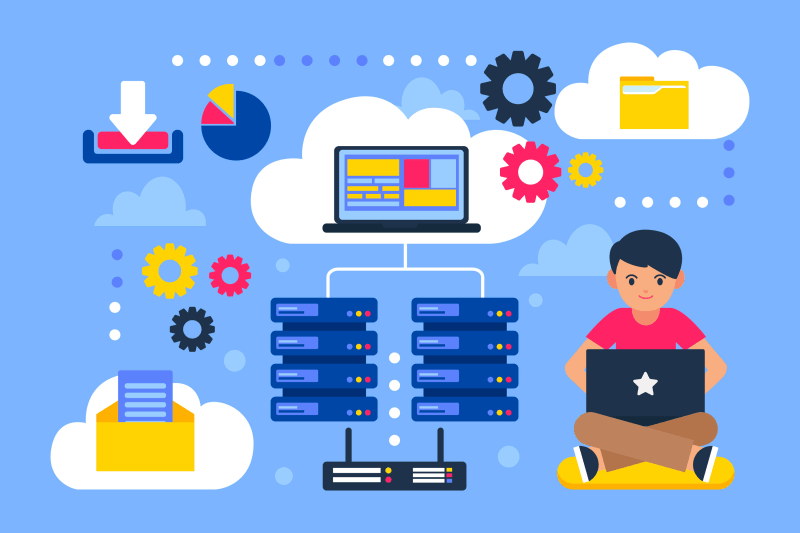Cloud Technology in ERP: A Beginner’s Guide
Enterprise Resource Planning (ERP) systems have revolutionized the way businesses operate by integrating various processes into a single platform. These systems streamline operations, enhance productivity, and provide real-time visibility into critical business data. With the advancements in technology, ERP systems have embraced cloud computing, offering numerous benefits to organizations of all sizes. In this beginner's guide, we will explore the concept of cloud technology in ERP and its advantages.
Understanding Cloud Technology in ERP
Cloud technology, in the context of ERP, refers to the deployment of ERP systems on cloud computing platforms rather than traditional on-premises infrastructure. Cloud-based ERP solutions are hosted and maintained by a third-party provider, who manages the hardware, software, and infrastructure required to run the system. Users can access the ERP software and its functionalities remotely through the internet using various devices such as desktop computers, laptops, tablets, or smartphones.
Benefits of Cloud Technology in ERP
Scalability: One of the significant advantages of cloud-based ERP is scalability. Businesses can easily scale up or down their ERP resources based on their needs. As the organization grows or experiences fluctuations in demand, the cloud infrastructure can quickly accommodate the changes, allowing seamless expansion or contraction of resources. This scalability ensures that businesses pay only for the resources they use, making it a cost-effective solution.
Cost Savings: Cloud-based ERP eliminates the need for upfront infrastructure investment and ongoing maintenance costs associated with on-premises solutions. Organizations can avoid expenses related to purchasing servers, data center facilities, hardware upgrades, and hiring IT personnel to manage the infrastructure. Instead, they pay a subscription fee to the cloud ERP provider, who takes care of all infrastructure-related tasks, including system upgrades, security patches, and backups. This cost-effective model allows businesses to allocate their resources more efficiently.
Accessibility and Flexibility: Cloud-based ERP systems offer unparalleled accessibility and flexibility. Since the software is hosted in the cloud, users can access it from anywhere, at any time, using an internet-connected device. This accessibility empowers employees to work remotely, collaborate across geographies, and access real-time data, enhancing productivity and efficiency. Additionally, cloud ERP solutions often provide mobile applications, allowing users to perform tasks on the go, improving flexibility and responsiveness.
Faster Implementation: Deploying an on-premises ERP system can be a time-consuming and complex process. It requires hardware setup, software installation, and configuration, followed by extensive testing and training. In contrast, cloud-based ERP solutions can be implemented relatively quickly. The cloud provider takes care of the infrastructure setup, software installation, and initial configuration, minimizing the implementation time. This rapid deployment allows businesses to start reaping the benefits of ERP sooner and reduces disruption to ongoing operations.
Enhanced Security and Data Protection: Cloud ERP providers invest heavily in security measures to protect their customers' data. They implement robust security protocols, including encryption, access controls, and regular security audits, to ensure data integrity and prevent unauthorized access. Cloud infrastructure providers often have data centers with high-level physical security measures, redundant systems, and disaster recovery capabilities, offering greater protection against data loss or system failures compared to on-premises setups.
Continuous Updates and Maintenance: Traditional ERP systems require manual updates and maintenance, often causing disruptions to business operations. Cloud-based ERP eliminates this burden by automatically applying updates and patches in the background. The cloud provider ensures that the ERP system is always up-to-date with the latest features, security enhancements, and bug fixes, freeing organizations from the time-consuming and resource-intensive task of managing software updates.
Advanced Analytics and Insights: Cloud-based ERP solutions often incorporate advanced analytics capabilities, leveraging the power of cloud computing. These analytics tools enable organizations to gain valuable insights from their data, helping them make informed decisions and identify trends, opportunities, and potential issues. With real-time analytics dashboards and reporting functionalities, businesses can monitor key performance indicators (KPIs) and take proactive actions to optimize operations and drive growth.
Challenges and Considerations
While cloud technology offers numerous benefits for ERP systems, there are some challenges and considerations to keep in mind:
Data Security Concerns: Storing data in the cloud raises concerns about data security and privacy. Organizations should carefully evaluate the security measures implemented by the cloud ERP provider and ensure compliance with relevant data protection regulations. Implementing additional security measures, such as encryption and strong access controls, can further enhance data security.
Connectivity and Reliability: Cloud-based ERP systems rely on internet connectivity. Any disruptions in internet service can impact access to the ERP system and hinder business operations. It is crucial to have a reliable internet connection and consider backup connectivity options to minimize downtime.
Vendor Selection: Choosing the right cloud ERP provider is critical. Organizations should assess the provider's reputation, experience, service-level agreements (SLAs), data center locations, and customer support capabilities. Thoroughly evaluating potential vendors and seeking recommendations from industry peers can help make an informed decision.
Data Migration and Integration: Moving from an existing on-premises ERP system to a cloud-based solution requires careful planning and execution. Data migration and integration can be complex tasks that need to be performed seamlessly to avoid data loss or disruption to business operations. Adequate testing and validation procedures should be in place to ensure a smooth transition.
Conclusion
Cloud technology has transformed the ERP landscape, offering businesses of all sizes the opportunity to leverage the benefits of integrated and scalable systems without the upfront costs and maintenance associated with traditional on-premises solutions. Cloud-based ERP solutions provide scalability, cost savings, accessibility, and enhanced security, empowering organizations to streamline operations, improve productivity, and make data-driven decisions. By considering the challenges and considerations associated with cloud ERP adoption, businesses can embark on a successful journey towards digital transformation and stay competitive in today's dynamic business environment.







Top comments (0)